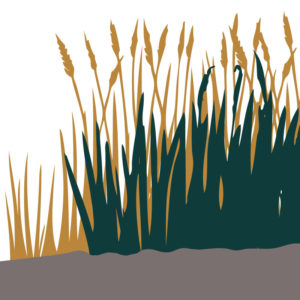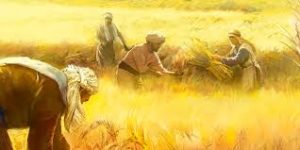The Parable of the Wheat and the Weeds
Matthew 13: 24-30
The one main point to the parable of the wheat and the weeds
is that the true planting will be imitated by a false counter-planting.
As part of the first couplet comprised of the parables of the Seed Growing by Itself (true) and the Wheat and the Weeds (false), we see the weeds scattered among the wheat. This parable teaches us that there would be a counterfeit planting alongside the true planting of the Word of God. As Christ continued to prepare His talmidim for their coming ministry of scattering the gospel seed to the ends of the earth (Matthew 28:19-20), He wanted them to be aware of the enemy and the counterfeit planting that would demonstrate a corruption of the visible church. There would be a distinct difference between the good wheat and the counterfeit darnel weeds.
Isra’el was supposed to be holy and set apart from all the other nations around them. When the children of Abraham were given the covenant with ADONAI at the foot of Mount Sinai by the hand of Moshe, 613 commandments were detailed in the Torah. There were commandments concerning distinction between clean and unclean food, childbirth, skin diseases, molds and bodily discharges. There were commandments about eating prohibited food, unlawful sexual relations, various commands regarding holy living, punishments for sin, regulations for priests, punishments for blasphemy, and covenant blessings for obedience and curses for disobedience. Namely, Isra’el was supposed to be a witness to the pagans around her. Why? So that the difference would be noticed by the goyim and they might inquire as to the reason behind those differences. Then Isra’el could point them to her God.
Today, believers are not supposed to live like the pagan world around us. Yochanan tells us: Do not love the world or anything in the world. If anyone loves the world, love for the Father is not in them. For everything in the world – the lust of the flesh, the lust of the eyes, and the pride of life – comes not from the Father but from the world (First John 2:15-16). Yet sin, unheard of among believers only a generation ago, is now commonplace. If repentance, holiness of life, and submission to the lordship of Messiah are all optional, why should we expect believers to be any different than the lost? Who is to say that people might not be believers just because they live in stubborn rebellion against God? If one claims to be a believer, how do we really know (see my commentary on Jude, to see link click Ah – Godless People Have Secretly Slipped In Among You)?
The tragic result is that many people think it’s fairly normal for the children of God to live like the Adversary. There’s even a word for it – the “carnal believer.” Who knows how many people who are living like the devil have been lulled into a false sense of spiritual security by the suggestion that they are merely carnal? Yes, believers are born with a sin nature and continue to commit sins throughout their lifetime. But, living in a carnal state should not be a lifestyle of unbroken indifference or antagonism toward the things of YHVH.
Believers do not masquerade as children of the devil. The very reverse is true; the deceiver pretends to be an angel of light, and his servants imitate the children of righteousness (Second Corinthians 11:14-15). When the Bible acknowledges the difficulty of telling the sheep from the goats (see my commentary on Revelation Fc – The Sheep and the Goats), the point is not that believers may seem ungodly, but rather that the ungodly often appear to be righteous. Or put another way, the flock is supposed to be on the lookout for wolves in sheep’s clothing, not that tolerant sheep should act like wolves.693

Jesus told them another parable: The kingdom of Heaven is like a man who planted good seed in his field. While everyone was sleeping, his enemy came and scattered weeds among the wheat, and went away (13:24-25). The weeds (or tares in the KJV) are from zizanion, a variety of darnel weed that produced useless seed instead of grain. It so closely resembled wheat that it was known as “bastard wheat.” It represents what is botanically known as the “bearded Darnel” (Lolium temulentum), a poisonous rye grass, very common in the Middle East. Until its seed is mature, it is nearly impossible to distinguish from the real wheat, even under the most careful scrutiny. Its roots creep underground and become intertwined with those of the good wheat. Because of the resemblance, scattering these darnel weeds over a neighbor’s good wheat seed was a common enough act that Rome made it a crime to do so. It was a devastating way to ruin an adversary, because it rendered his crop useless – and thus nullified his chief source of income.694
But, the parable gains in meaning if we bear in mind that according to the rabbis they teach that before the Flood all seeds were the same. But as a result of the Flood, the darnel weed became a degenerate kind of weed that sprang up from the good seed through the corruptness of the earth. Now, unfortunately, they are common to all fields; wholly indistinguishable from the wheat until the fruit appeared: noxious, poisonous, and requiring to be separated from the wheat, lest the good wheat not become useless.695

They will be allowed to grow side by side. When the wheat sprouted and formed heads, then the weeds also appeared. The owner’s servants came to him and said, “Sir, didn’t you plant good seed in your field? Where then did the weeds come from?” “An enemy did this,” he replied. So the servants asked him, “Do you want us to go and pull them up?” “No,” he answered, “because while you are pulling the weeds, you may uproot the wheat with them. Let both grow together until the harvest. At that time I will tell the harvesters: First collect the weeds and tie them in bundles to be burned; then gather the wheat and bring it into my barn”(13:26-30).
What can this parable mean? It is surprising that the crowd by the seashore did not ask, but they were probably more interested in seeing miracles and being fed than knowing the truth (John 6:26). The talmidim, however, did want to know. Matthew 13:36 says that after the Lord left the crowd and entered Peter’s house (see Ez – The Private Parables of the Kingdom in a House), the apostles said to Him in private: Explain to us the parable of the weeds in the field (see Fa – The Parable of the Weeds Explained).
We are going to look at nine parables that develop a basic flow of thought: (1) The Parable of the Soils (Et) teaches us that there will be different responses to the scattering of the Gospel throughout the Church Age. (2) The Parable of the Seed Growing By Itself (Eu) teaches that gospel seed will have an inner energy so that it will spring to life on its own. (3) The Parable of the Wheat and the Weeds (Ev) teaches that the true planting will be imitated by a false counter-planting.696
In 1915 Pastor William Barton started to publish a series of articles. Using the archaic language of an ancient storyteller, he wrote his parables under the pen name of Safed the Sage. And for the next fifteen years he shared the wisdom of Safed and his enduring spouse Keturah. It was a genre he enjoyed. By the early 1920s, Safed was said to have a following of at least three million. Turning an ordinary event into an illustration of a spiritual truth was always a keynote of Barton’s ministry.
Now while I was setting out the Roots which Keturah had bought from the one who made the Seed Catalogue, I found one root that Stuck up out of the Ground, and I laid hold upon it, and I said, Here is a Root that Beareth no Label. I wonder what it is. Behold, I know not, yet will I plant it, and see what Cometh up.
And Keturah answered and said, Knowest thou not what that is? It is a Dandelion that thou didst Dig up in making the Holes for the Flowers. And I was ashamed that I had not known it before. Nevertheless, I saw what it was, even while she was telling me. For I am not wholly Ignorant, albeit for the moment I knew not the root, what it was.
And I beheld the Dandelion root in my hand. And I looked at it, and beheld how Deep it had sunk into the Earth, and how firmly it had laid hold on the Soil with its one long Root, and I admired the way it had planned to Stay Put.
And I looked at the top, and though it seemed to have not life, yet there were Leaves Curled up and ready to push themselves forth, yea, and a Bud that was all but ready to lift its head above the ground as soon as the winter was past.
And I said to the Dandelion, Behold thou art a Plucky Plant. Thou sinkest thy Root to a Great Depth. Thou sendest up thy Hollow Stalk in the form of Construction the Strongest known to any Engineer. Thy White Ball of soft Down is the most Beautiful and Delicate thing in Nature; yea, and even thy Yellow Blossom is Marvelous, for every little yellow leaf is a flower. Moreover, it is not thy fault that folk call thee a Weed. If it were only Hard to make thee Grow, we would pay Good Money for thy Roots, and break our Backs setting thee out, and declare that a sight of thee, sprinkling thy gold over a green Lawn, was the Perfection of Gardening. Neither didst thou sin nor thy parents, yet art thou Despised and Rejected, and good folk Love thee Not.
And when I thought of these things, I could not find it in my heart to cut off a life so wonderful and so plucky; neither did I want it in my garden. However, I took it down to the Alley that runneth behind my house, and I planted it there. And I said, Now the Lord judge whether it be not better thou shouldst grow there than that the ground be cumbered by a Tin Can.
Yet I looked around and hastened back to the House lest my Neighbors should know that I had planted a Dandelion.
And who knoweth whether I did right or wrong? For if some great Blight should come upon the Dandelions in the Front Lawns of all peoples, then would they come and seek in my Alley, and beg a seed of my Dandelion.
For though I be chided for giving the Dandelion a Fighting Chance for its life, yet I have known those whose lives were as Weeds whom God Spared in His Mercy, and they Bloomed in Wonderful and Unexpected Goodness.697



Leave A Comment